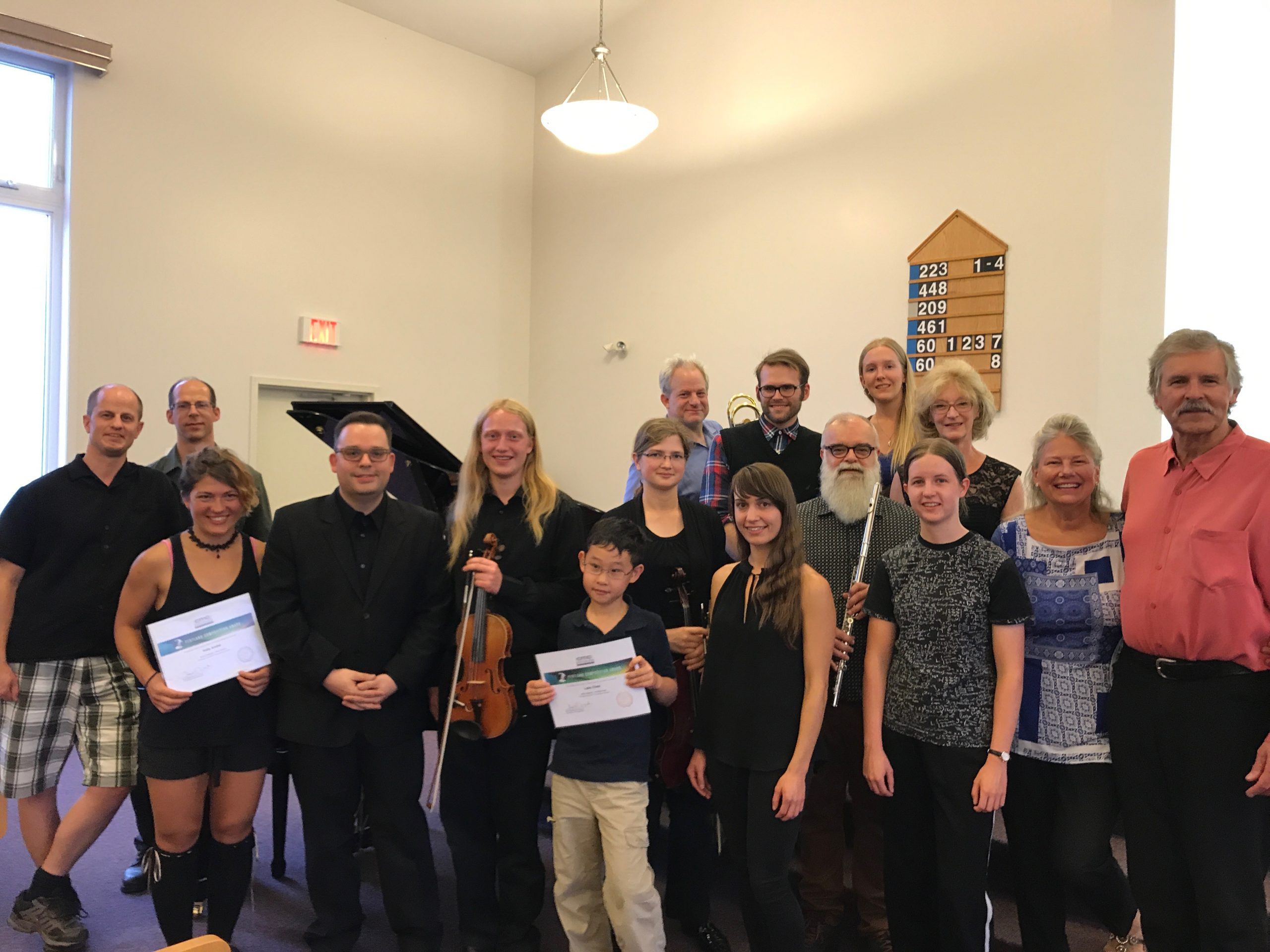Recently, the Orchestra North Summer Program invited CMC BC’s Stefan Hintersteininger to participate in their 2017 summer session in Smithers, BC, as part of an exciting new community partnership we’ve formed with this dynamic organization. We wanted to help document some of the incredible work that is being done by these highly dedicated and passionate musicians up in the Skeena region of BC.
This is the second instalment of Stefan’s blog about his experiences and what he observed there. For Part I, click here:
A very special highlight of this year’s Orchestra North Summer Program was the Creating Composers series of workshops led by Rodney Sharman, and facilitated by Turning Point Ensemble and the Canadian Music Centre in BC. The ten participating composers, who ranged in age from 9 to adult, represented the North spectacularly well, producing pieces of exceptional quality and emotional range. Kaia Andal‘s meditative, minimalist Four Corners called for the performers to be positioned spatially throughout the church, while playing a three-bar sequence of pitches, all while slightly offset from each other. The youngest composer, nine-year-old Luke Chen, produced a witty and charming duet for violin and trombone, appropriately entitled A Child’s Song. Rodney Sharman related to the audience how Luke had fully mastered music notation software in just two days during the ONSP session.
Kiri Daust, a skilled violinist and fiddler by training, composed his work Arubella (based on a folk tune) for violin, cello, double bass and trombone. The piece made full, delicious use of the rich harmonies available through the bass-heavy instrumentation. As he did with his orchestral work Arise, Kent Dykstra again transformed a familiar hymn tune, this time into a lively jig that included nearly all available instruments. One could easily imagine that this rollicking piece be easily expanded into a larger work for full orchestra. Bethany Horrocks‘ title, While the World Passes By, perfectly described her haunting, melancholy composition, characterized by a rocking motive in the violin and piano with heartfelt melodies played by the flute and the cello. And although it is difficult to fathom based on the level of skill and inspiration evidenced in Courtney Horrocks‘ piece Untitled, that this work for recorder and violin was one of her very first notated compositions. Again inspired by folk music, the piece was in two sections, the first slow and haunting, the second a lively jig in 7/8 meter with the violinist imitating a drum by knocking on the body of her instrument.
Luke Ongman‘s piece, also Untitled, showed a flair for the dramatic and a sensitivity for instrumental colour, and as with Kent Dykstra’s piece, suggested a strong potential for expansion to a longer piece for full orchestra. The same was also true of Brent Yoder‘s composition, an energetic duet (or ‘duel’) for two solo violins and ensemble, showing a strong awareness of orchestral colour and instrumental virtuosity. Andrea Pedro, a phenomenal pianist, contributed a short but intense duo for flute and cello that explored extended techniques and proportional notation, the only piece to do so. Judith Souman, a stellar young violist who also gave a heartfelt performance of Max Bruch’s Romance in another concert, contributed Of Wind and Trees for violin, trombone and piano. Judith’s piece seemed a touching, evocative, yet abundantly spacious portrait of the vast northern landscape.
I was thrilled for the opportunity to participate in these workshops both as a cellist and as an observer for the Canadian Music Centre in BC. I was particularly struck by the delicacy, sensitivity and honesty of these compositions. It became clear to me rather quickly that what we were hearing was the music of right here and right now. The personal experiences of these composers are completely unique to their time and place in the world, and the result is a particular sound-world that one could not encounter anywhere else.
As we rehearsed the pieces, common themes emerged; the vastness and beauty of the North and the close proximity of its inhabitants to nature; the ubiquitous presence of folk music and fiddling, through which many children get their first musical bearings; the rich tradition of well-loved church hymns that are passed down through the generations. All of these influences, and more, came together to make for a truly magical creative experience.
Although the jurors had a very difficult time deciding on the winning pieces given the consistently high level of composition, CMC BC was pleased to present two Barbara Pentland Awards for Outstanding Composition: In the Junior Category, the recipient was Luke Chen for A Child’s Song. In the Senior Category, the recipient was Kaia Andal for Four Corners.
At the conclusion of the festival, the faculty assembled once more to give performances of some of their favourite repertoire. Appropriately, the final selection of the concert was the Cole Porter classic, Every Time We Say Goodbye, in a luminous arrangement by Rodney Sharman, with Rosemary Thomson (and who knew that she is such a superb jazz singer as well as conductor and pianist?) assisted by Vince Vohradsky on his mellow-voiced fluegelhorn. There could not have been a lovelier or more appropriate ending to this superb festival.
Special mention and congratulations must be given to Founder and Artistic Director Roxi Dykstra. She has managed to build a world-class festival in a rather unexpected place. The level of community engagement achieved by the festival is astonishing, and the sheer joy of music-making on the part of the many youth and adult participants was quite wonderful to see.
[envira-gallery id=”2412″]

